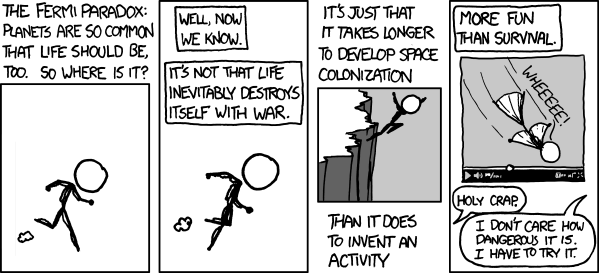Difference between revisions of "962: The Corliss Resolution"
(added categories, reference to 384) |
(→Explanation: partial rewrite) |
||
| Line 9: | Line 9: | ||
==Explanation== | ==Explanation== | ||
| − | |||
| − | + | {{w|Jeb Corliss}} is a professional BASE jumper and wingsuit flyer, like in the fourth panel. Corliss has jumped from a lot of different buildings and monuments in the world. Hence, the Corliss Resolution. | |
| − | + | The {{w|Fermi paradox}} is an astronomical problem that states: "The universe is large enough that many planets should have extraterrestrial intelligent life. Why, then, haven't we detected any signs of it?" The paradox has numerous hypothetical solutions — some say that life is much rarer than we think, and others suggest that civilizations will eventually destroy themselves (as mentioned in the comic). | |
| + | |||
| + | Randall proposes another solution to the Fermi paradox: before they can develop space travel and the like, civilizations will inevitably invent an "activity more fun than survival." That is, something fun that's also very dangerous, such as flying off a cliff in a wingsuit. | ||
| + | |||
| + | As said in the title text, a being that can already fly (hence "avian society") would probably prefer flying around outside over developing the tools needed for space colonization. | ||
| + | |||
| + | See [[384: The Drake Equation]] for another comic about intelligent life in the universe. | ||
==Transcript== | ==Transcript== | ||
Revision as of 06:43, 28 January 2013
| The Corliss Resolution |
 Title text: And no avian society ever develops space travel because it's impossible to focus on calculus when you could be outside flying. |
Explanation
Jeb Corliss is a professional BASE jumper and wingsuit flyer, like in the fourth panel. Corliss has jumped from a lot of different buildings and monuments in the world. Hence, the Corliss Resolution.
The Fermi paradox is an astronomical problem that states: "The universe is large enough that many planets should have extraterrestrial intelligent life. Why, then, haven't we detected any signs of it?" The paradox has numerous hypothetical solutions — some say that life is much rarer than we think, and others suggest that civilizations will eventually destroy themselves (as mentioned in the comic).
Randall proposes another solution to the Fermi paradox: before they can develop space travel and the like, civilizations will inevitably invent an "activity more fun than survival." That is, something fun that's also very dangerous, such as flying off a cliff in a wingsuit.
As said in the title text, a being that can already fly (hence "avian society") would probably prefer flying around outside over developing the tools needed for space colonization.
See 384: The Drake Equation for another comic about intelligent life in the universe.
Transcript
- The Fermi Paradox: Planets are so common that life should be too. So where is it?
- [A person with an unusual suit runs.]
- Well, now we know. It's not that life inevitably destroys itself with war.
- [The person keeps running.]
- It's just that it takes longer to develop space colonization.
- [The person leaps off a cliff]
- Than it does to invent an activity..
- ..more fun than survival.
- [Youtube video of the person, with the suit opening up into a wingsuit. As this is youtube, the comments have not been shown. Two people are watching the video offpanel.]
- Person 1: Holy crap.
- Person 2: I don't care how dangerous it is. I have to try it.
Discussion
But technological development is eventually going to make wingsuit flight safe, so how are we going to explain our continued survival after that? Davidy²²[talk] 08:28, 9 March 2013 (UTC)
Rocket-Sneakers(TM) 178.105.151.131 06:59, 25 April 2013 (UTC)
When wingsuits become safe, they will become common, and will therefore not be as much fun. In the mean time, someone will have invented something else which is both fun and dangerous (like the aforementioned Rocket-Sneakers(TM)) Drmouse (talk) 13:19, 10 January 2014 (UTC)
"before they can develop space travel and the like, civilizations will inevitably invent an "activity more fun than survival." That is, something fun that's also very dangerous, such as flying off a cliff in a wing-suit."
Before they can develop space travel and the like, civilizations will have to invent an activity more fun than jumping off a cliff in a wing-suit and the like. Space travel is boring. Engineering space travel is boring with maths and work in it too. I used Google News BEFORE it was clickbait (talk) 22:22, 22 January 2015 (UTC)
"As said in the title text, a being that can already fly (hence "avian society") would probably prefer flying around outside over developing the tools needed for space colonization."
I don't think that's accurate (the logic of avian sentients choosing to not develop space travel due to the enjoyment of flying; the title text interpretation being this is fine) because that is from a non-avian sentient perspective. To a sentient avian, flying would be normal, and thus as boring as walking is to us. And if you think walking is fun, YOU are boring. -- OriginalName (talk) 02:00, 26 April 2017 (UTC) (please sign your comments with ~~~~)
- For one, that's the joke. For two, I would strongly encourage you to read Jonathan Livingston Seagull. MeZimm (talk) 18:22, 13 November 2020 (UTC)
 Add comment
Add comment
